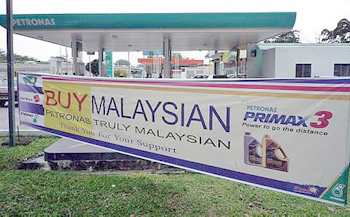
| Save money, buy Malaysian |
 |
| Monday, 02 February 2009 00:00 |
|
Malaysian-made products may be exported to many First World countries but many locals are still stuck in the mindset of only opting for imported goods. WHEN Michelle Loh, 29, buys something, the first thing she looks for is its quality. And if that product happens to be Malaysian-made, it will be even better for her. “I don’t mind trying the product. Why should we buy foreign products if the local equivalent is as good and cheaper?
 Major drive: Petrol stations, hypermarkets and supermarkets have put up signs urging people to buy Malaysian during the year-long campaign that covers all industries. “I am happy when I can find a clothes label which reads Made in Malaysia,” she says. The Government is currently encouraging Malaysians to have the same mindset as Michelle through the on-going ‘Buy Malaysian’ campaign.
The campaign was launched on Jan 16 by Prime Minister Datuk Seri Abdullah Ahmad Badawi who urged Malaysians to cast aside their prejudice against local products, especially during the global economic slowdown. Abdullah said one way of stimulating the domestic economy is to boost local production as the slowdown in other countries has affected exports. He said production and growth of the local manufacturing sector will be boosted if Malaysians bought more of the local products. Year-long campaign
"If we don’t help our own country, who will?" - Datuk Ameer Ali Mydin An official from the Domestic Trade and Consumer Affairs Ministry says the campaign would run throughout the year with exhibitions and advertisements in the media to highlight the different Malaysian products. He says the campaign covers all industries from consumer items, construction, electronics, furniture, apparel, and shipping to banking and services. The ‘Buy Malaysian’ concept is not new – it was first launched in 1984 and again in 1998 during the last financial crisis. Hypermarkets, supermarkets and even petrol stations have put up signs urging people to buy Malaysian. The question is, will buying Malaysian make a difference to us? Rajen Devadason, a Securities Commission-licensed financial planner with MAAKL Mutual Bhd says all Malaysians will benefit. “The Malaysian consumer will hopefully end up spending less on some items because of lower retail prices. “This should allow him or her to save more in the bank, thus increasing vital personal savings in this ‘cash is king’ environment,” he says. Rajen adds that this will also lead to the Malaysian banking sector gaining from an enhanced capacity to earn profits by lending out the increased savings to viable Malaysian businesses. “At the point of purchase, Malaysian retailers will enjoy beefed up earnings. This will encourage them to spend more with Malaysian wholesalers in a bid to grow their businesses,” he says. Rajen also believes that it might help avert a recession. “While Singaporeans are much richer than we are, our population is about five or six times larger. This allows Malaysians to make a bigger difference to the health of our economy by simply thinking before channelling our increasingly precious store of cash to where it should do the most good – for us and for our country,” he says Paul Selvaraj, Chief Executive Officer at the Education and Research Association (Era) for Consumers Malaysia, supports the campaign but is unsure about how it will be conducted. “People need to know what the products are in the first place,” he says. Currently, only some products have logos stating they are made in Malaysia. These are mainly food items. “There is a misunderstanding in Malaysia that all vegetables and canned goods are produced in Malaysia. If people know what is really from Malaysia they can make a choice,” says Selvaraj. But that might also be where the problem lies as there is a perception that Malaysian goods are inferior in quality. Selvaraj says multinational companies have spent millions to create their brand names and presence. “We can take the example of a popular toothpaste and a soft drink. We have been watching their advertisements all our life and automatically we think it’s better than other brands,” he says. Melvin Rodrigo, 55, who is not aware of the latest campaign, agrees with Selvaraj and believes that people are brainwashed by advertisements. “It’s the inside and not the outside that matters. We shouldn’t judge something by its wrapper although the taste in the end boils down to the individual,” he says. Izra Sofiah, 20, on the other hand, prefers foreign products – especially when it comes to clothes and movies. “If the Malaysian equivalent had the same quality I would definitely go for it,” she says. Selvaraj points out that the house brands sold in hypermarkets are gaining popularity. These products are manufactured by local small and medium enterprises (SMEs), and are 20% -30% cheaper than the other brands. “At least try it once and judge for yourself. Don’t carry the baggage that it is inferior,” he says. Selvaraj says that one way to convince people that Malaysian products are equivalent in quality with brand names or imported goods, is for the local industries to go towards voluntary testing by independent parties. Selling Malaysian The Mydin chain of hypermarkets is actively participating in the Buy Malaysian campaign. Its director Datuk Ameer Ali Mydin says the Malaysian-made products are highlighted to make people aware of them. Ameer says charity begins at home and conducting such a campaign did not mean Malaysians were inward looking. “If we don’t help our own country who will? Other countries have their own stimulus packages to help themselves,” he says. Like Selvaraj, Ameer says it is a learning process for consumers to realise that Malaysian products are not bad. “We never bought anything from China or Hong Kong 10 to 15 years ago. We only used to buy products from Japan because of its quality. But now almost everything is made in China,” he says. Ameer adds that the perception that “branded” products are best is wrong. He gives the example of local sauces produced by the SMEs which are of high quality. “We produce a lot of things which are exported,” says Ameer, giving the example of Bonia handbags, which are accepted international brands. But how are Malaysian products defined in this campaign? “Anything that is produced in Malaysia,” says Ameer. This means that Milo, for instance, which is a product of Swiss company Nestle comes under the Malaysian banner. “It might be a foreign brand but the product is manufactured here. These companies are investing money here and creating jobs for Malaysians,” explains Ameer. Datuk Marimuthu Nadeson, President of the Federation of Malaysian Consumers Association (Fomca), says the campaign can only work if people have a sense of belonging to country and understand the Government’s initiative.
 “Korea and Japan were successful in similar campaigns because their people are patriotic. What needs to be done is disseminating information about the products,” he says, adding that the import bill which stood at RM17.93bil in 2005 can be minimised. Consumers Association of Penang (CAP) President S.M. Mohd Idris believes the campaign will be viable if it gets the support of every Malaysian. “If it is something that is locally available why not give it a try? Except for some food products, Malaysia has almost everything,” he says. Clothes and shoes are among the products manufactured in Malaysia and sold in First World countries, he says. “What people do not know is that they are actually paying for the brand name and, of course, packaging. “Every product we buy may cost very little but the name costs money. Non- Malaysian products cost more as taxes are inevitable.” Idris says that many First World countries sell products manufactured in Third World countries such as China. “These goods must meet the standards of the countries that import the goods. Meeting standards is important. Standards should be internationally synchronised. What is good for one country should be good for all,” says Idris. Noor Nirwandy, project manager of the Malaysian Muslim Consumers Association (PPIM), believes the campaign has not been very successful because of the inability of Malaysian brands to penetrate the local market. “There are many products from SMEs which are good and relatively cheap. Many hypermarkets don’t carry these brands. If they try to compete with the MNC’s they will be limited and restricted. They have not reached the overall target,” he says. Noor Nirwandy also disagrees with the definition of ‘Malaysian’ products because many of them are not 100% local. “Even the house brands claim to be Malaysian but this seems to be mere rhetoric, he says. In any case, a student who wants to be known only as Hisham hopes to see politicians walk the talk before preaching to the public about buying Malaysian. “They should be driving Malaysian cars and they should not be wearing Italian-made suits and shoes,” he says. Source: http://thestar.com.my/news/story.asp?file=/2009/2/1/focus/3160846&sec=focus |
| Last Updated on Friday, 06 February 2009 01:55 |